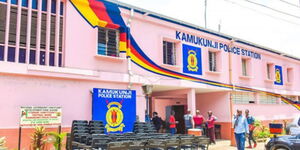A woman from Likoni, Mombasa on August 1, 2020, requested President Uhuru Kenyatta to visit the area after two individuals were injured following an attack.
The woman complained that there had been a surge in criminal activities in the area since Interior CS Fred Matiang'i visited in 2018.
"When Matiang'i visted, crime-related activities in the area dwindled for a while but resumed after some time. We are tired and are calling on Matiang'i and the president to stop the sale of drugs," she emotionally stated.
"I am kindly asking the president to come visit us and help stop the illegal sale of drugs. Who will bury the women when they die?" she posed.
Another woman joined in the conversation saying that their children were abusing drugs and it was gravely affecting them.
She further requested the government to beef up security in the area, alleging that the gang was being protected by individuals in high places.
The residents have since threatened to stage demonstrations if the culprits who assaulted the two individuals were not brought to book.
In August 2019, the Interior CS visited the area and warned that government would take action on crime and drug trafficking in the area.
"We will turn things upside down to unearth even those among security apparatus and highly placed state officials that have been shielding drug traffickers," he stated.
At the time, his trip to the coast had been probed by a night attack, where a panga-wielding gang attacked Bamburi residents and slashed 11 people.
“The attack is symptomatic of deep-seated challenges we must address relating to security in the Coast," Matiang'i stated.
He added that political leaders were reviving and reinventing criminal gangs under the guise of political mobilisation.
“There is a clear nexus between the movement and peddling of drugs in the Coastal region with certain political activities and with people who are highly placed in this society," he stated.












